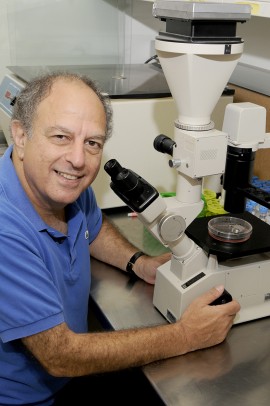Researchers define role of key protein in link between high-fat diet, cancer metastasis
People with obesity are more likely to develop cancer and respond less well to treatment, leading to a higher death rate from cancers of many types. The link has led researchers to look at the influence of a high-fat diet on the tumor growth and metastasis associated with deadlier cancers.
In a new paper for Cell Metabolism, a University of Illinois Chicago laboratory examined CD36, a protein thought to be central to this link. CD36 sits in the cell membrane and is involved with how cells absorb fatty acids. While the protein was implicated in several cancers and metastasis, its exact role remained unknown.
A team led by Nissim Hay, professor of biochemistry and molecular genetics in the College of Medicine, set out to clarify the function of CD36 and its potential as a target for cancer therapy. Their experiments found a more nuanced function than anticipated: rather than acting as an open door for all fatty acids to enter cells, CD36 actually protects cells from the harmful effects of those lipids.
If too many saturated fatty acids — the type found in meat and high-fat oils — enter a cell, it can be toxic. Hay’s group found that CD36 protects cells from this lipotoxicity by selectively allowing unsaturated fatty acids — the healthier form found in nuts and olive oil — into the cell, maintaining a balance that keep cells alive.
Under normal circumstances, that protection is a benefit. But in cancer cells, preventing death and absorbing lipids can lead to growth and division, the drivers of metastasis. A high-fat diet could further accelerate these processes, creating more aggressive tumors.
The results suggest strategies for treating cancer. A healthier, low-fat diet — already a common recommendation for cancer patients — could help prevent the cancer-promoting effects of CD36. The protein itself also offers a promising drug target; in animals, deleting the gene for CD36 protected against metastasis in a model of breast cancer.
“CD36 was already considered a treatment target, because when you delete it, there are no significant adverse physiological consequences,” said Hay, who also is a member of the University of Illinois Cancer Center. “Currently, there are not any specific inhibitors of CD36, but it’s a very good target for preventing metastasis, especially in obese patients.”
Additional UIC co-authors on the paper include Alexander Terry, Veronique Nogueira, Hyunsoo Rho, Gopalakrishnan Ramakrishnan, Jing Li, Soeun Kang, Koralege C Pathmasiri, Sameer Ahmed Bhat, Liping Jiang, Shafi Kuchay and Stephanie Cologna.

